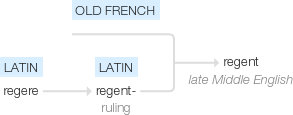Regent
late Middle English: from Old French, or from Latin regent- ‘ruling’, from the verb regere .
wiktionary
From Middle English regent, from Anglo-Norman regent, Middle French regent, and their source, Latin regēns(“ruling; ruler, governor, prince”), present participle of regō(“I govern, I steer”).
etymonline
regent (n.)
c. 1400, "a ruler," from the adjective regent "ruling, governing" (late 14c., now archaic), later "exercising vicarious authority," from Old French regent and directly from Medieval Latin regentem (nominative regens), from Latin regens "ruler, governor," noun use of present participle of regere "to rule, direct" (from PIE root *reg- "move in a straight line," with derivatives meaning "to direct in a straight line," thus "to lead, rule").
Meaning "one who rules during the minority or absence of a sovereign" is from early 15c., used in place of king as not implying legitimacy or permanence of rule. The Latin word for this was interrex (plural interreges). Sense of "university faculty member" (especially, in old universities, a master or doctor who takes part in the regular duties of instruction or government) is attested from late 14c. and preserves the older meaning.
I shall calle unto me my counceyle of my moste trusty knyghtes and deukes and regeaunte kynges and erlys and barowns. [Malory, late 15c.]
